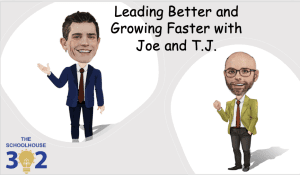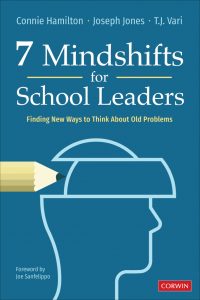
Leading Better and Growing Faster with Joe & TJ: Guest Curtiss Murphy Talks about What Makes Great Managers Great
About Curtiss Murphy
Curtiss Murphy has spent 32 years as a software engineer (20 of those years in games and gaming and twelve years building educational games. He spent 3 summers hosting the NSF’s Edugaming workshop and six years as a professor of game design at Laguna College of Art and Design (for their Game Design MFA program).
He has a few dozen minor publications/chapters. He’s an award-winning speaker, author, and game designer. He’s been on 21 episodes of the podcast Game Design Zen. He’s currently the VP of Engineering at a Mobile Game Studio.
He is the recent author of What Makes Great Managers Great: How to Raise Engagement, Give Feedback, and Answer the Questions No One’s Asking.
What You’ll Find in this Episode with Curtiss Murphy
Curtiss starts by flipping the show back to Joe and T.J. with a question about why they would want to have an “outsider” from education on the show. Listen to hear about comfort zones, learn from new people, and seek alternative perspectives. That’s what Leading Better and Growing Faster with Joe and TJ is all about.
Curtiss simply says it, many managers are doing it wrong. His story will resonate with you as he admits that he once was one as well. Don’t miss what he says about how it all changed for him.
You want to hear what he says about medical errors and deaths based on miscommunication.
He talks about going from 5 people to 40 and what management practices have done to increase performance on his team.
The number one premise to start with as a leader is that there’s confusion everywhere. ~ Curtiss Murphy
Tune in to hear why we must always be clarifying expectations.
Joe asks about “safety and making people feel safe at work.”
Reminder for school leaders: Whatever we do impacts our employees. Don’t miss what Curtiss says about “not enough” in this category.
Curtiss looks for inspiration from his wife (and he tells us that we can’t have her).
He talks about being a nerd by trade and using the rules of improv (we wrote about this in 7 Mindshifts for School Leaders). Three rules: (1) accept everything, (2) use yes, and (3) make your co-workers and partners look good.
Curtiss wants to learn to be calm, be in the moment, and slow down his sense of urgency.
He focuses on praising people for supporting the behaviors that he wants them to repeat.
Curtiss used to think that his job was just to empower people; he learned to empower the skill, not the person.
His final thought: leadership = influencing others through trusting relationships.
The Leading Better & Growing Faster with Joe & T.J. Show
Let us know if there’s a guest who you want us to have on the show by leaving a comment below or by contacting us at [email protected]. And don’t miss our leadership content updates every week by subscribing to the site.
We can’t wait to hear from you.







 7 Mindshifts for School Leaders: Finding New Ways to Think About Old Problems.
7 Mindshifts for School Leaders: Finding New Ways to Think About Old Problems. 


